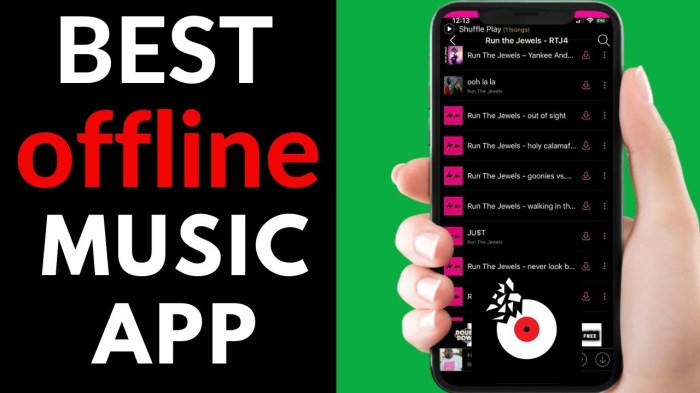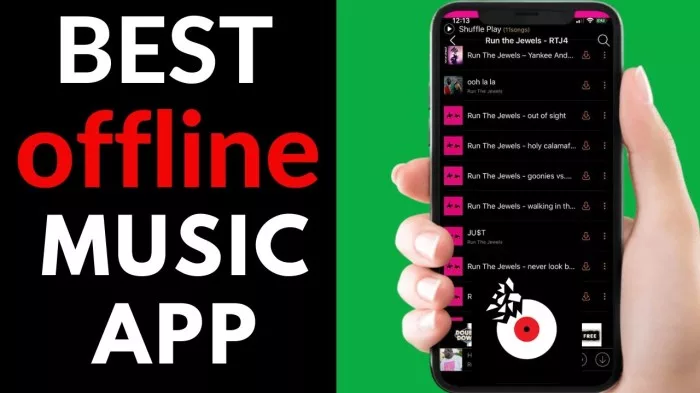In the realm of music streaming, offline music apps stand as a beacon of convenience, offering the freedom to enjoy our favorite tunes without the constraints of an internet connection. From popular platforms to niche offerings, this guide delves into the world of offline music apps, exploring their features, advantages, and considerations.
Whether you’re an avid music enthusiast seeking uninterrupted listening or a casual user looking to save data, offline music apps provide a solution tailored to your needs. Dive into this comprehensive exploration and discover the boundless possibilities of offline music enjoyment.
Popular Offline Music Apps

In the era of streaming music services, offline music apps offer a valuable alternative for those seeking convenience and control over their music experience. These apps allow users to download and store music on their devices, providing access to their favorite tunes even without an internet connection.
Numerous offline music apps are available, each with its unique set of features and benefits. Here’s a comprehensive list of the most popular options:
Spotify
- Extensive music library with millions of songs
- Personalized playlists and recommendations
- High-quality audio streaming
- Offline listening mode
- Cross-platform availability
Apple Music
- Vast catalog of over 100 million songs
- Exclusive content from Apple Music artists
- Lossless audio playback
- Spatial audio support
- Integrated with Apple ecosystem
YouTube Music
- Access to millions of music videos and live performances
- Personalized music recommendations based on watch history
- Background playback and offline listening
- Integration with YouTube Premium for ad-free experience
- Availability on various platforms
Amazon Music
- Large music library with over 100 million songs
- Unlimited skips and replays
- HD and Ultra HD audio streaming
- Exclusive content from Amazon Music artists
- Integration with Amazon Prime subscription
Deezer
- Extensive music library with over 90 million songs
- High-quality audio streaming with HiFi and FLAC options
- Personalized music recommendations and playlists
- Offline listening mode
- Integration with various smart devices
Features of Offline Music Apps
Offline music apps offer a range of features that enhance the user experience and make them convenient for listening to music without an internet connection. These features include:
- Music Library Management:Allows users to organize and manage their music library, create playlists, and customize their listening experience.
- Offline Playback:Enables users to download and store music on their device for listening without an internet connection.
- Equalizer and Sound Effects:Provides users with the ability to adjust the sound quality and effects to suit their preferences.
- Gapless Playback:Ensures smooth and seamless transitions between songs, eliminating any pauses or gaps.
- Sleep Timer:Allows users to set a timer to automatically stop playback after a specified period of time.
- Lyrics Display:Displays song lyrics on the screen, allowing users to sing along or follow the words.
These features collectively provide a user-friendly and comprehensive music listening experience, making offline music apps an indispensable tool for music enthusiasts who value convenience and flexibility.
Music Library Management
Offline music apps allow users to create and manage their own music libraries, which can be organized by artist, album, genre, or any other criteria. This enables users to easily find and play the music they want, and to create custom playlists for different occasions or moods.
Offline Playback
The ability to download and store music on their device is a key feature of offline music apps. This allows users to listen to their music without an internet connection, making it ideal for situations where connectivity is limited or unavailable, such as on flights, road trips, or in areas with poor signal.
Equalizer and Sound Effects
Many offline music apps offer built-in equalizers and sound effects that allow users to customize the sound quality of their music. This enables users to adjust the bass, treble, and other settings to suit their personal preferences and the specific music they are listening to.
Advantages of Using Offline Music Apps
In the digital age, music streaming services have become ubiquitous, offering a vast selection of songs at our fingertips. However, offline music apps provide unique advantages that make them a compelling choice for music enthusiasts.
One of the most significant benefits of using offline music apps is the ability to save data. By downloading music to your device, you can avoid consuming your data plan when listening to music, which is especially beneficial when traveling or in areas with limited internet connectivity.
Avoid Interruptions
Offline music apps also eliminate the frustration of interruptions caused by poor internet connections or buffering. When streaming music, sudden drops in connectivity can lead to annoying pauses or even skipped tracks. Offline music apps ensure that your listening experience remains uninterrupted, allowing you to enjoy your music without any glitches.
Access Music Without Internet Connection
Perhaps the most significant advantage of offline music apps is the ability to access your music even without an internet connection. This is crucial in situations where internet access is unavailable, such as during flights, road trips, or in remote areas.
With offline music apps, you can continue to listen to your favorite tunes without worrying about connectivity issues.
Drawbacks of Using Offline Music Apps
While offline music apps offer several advantages, they also come with certain drawbacks. These limitations should be considered before deciding whether to use an offline music app.
Storage Space Limitations
One of the main drawbacks of offline music apps is that they require storage space on your device. Each song or album takes up space, and if you have a large music collection, it can quickly fill up your device’s storage.
If you’re looking for a way to enjoy your music offline, there are a number of great apps available. These apps allow you to download and store your music on your device, so you can listen to it anywhere, anytime.
Just like how car insurance comparison sites help you find the best deals on car insurance, these offline music apps help you find and enjoy your favorite music.
This can be especially problematic on devices with limited storage capacity, such as smartphones or tablets.
Lack of Access to the Latest Music
Another drawback of offline music apps is that they do not provide access to the latest music. Once you have downloaded a song or album, you will not be able to update it to the latest version unless you manually download it again.
This can be a problem if you want to listen to the latest releases or if you want to access new music that is not yet available offline.
Potential Compatibility Problems, Offline music apps
Finally, offline music apps can sometimes have compatibility problems. This can occur if you use different devices or if you update your operating system. In some cases, you may not be able to access your downloaded music on a new device or after updating your operating system.
This can be a frustrating experience, especially if you have a large music collection.
Enjoy seamless music offline with our top-rated offline music apps. For added peace of mind while your kids explore the digital world, consider implementing one of the best parental control apps for Android. Rest assured, your kids can safely navigate the online music world with these essential tools.
Considerations for Choosing an Offline Music App
Selecting the right offline music app is crucial for an optimal listening experience. Here are key factors to consider:
App Features:Evaluate the features offered by the app, such as music playback controls, playlist management, and offline storage capabilities.
User Interface
The app’s user interface should be intuitive and easy to navigate. Consider the app’s layout, menu options, and overall design.
Music Library
The size and diversity of the app’s music library is important. Check if the app offers a wide range of genres and artists, as well as the ability to import music from your own library.
Compatibility with Devices
Ensure the app is compatible with your device’s operating system and hardware. Consider whether the app supports multiple devices and allows for seamless music transfer.
Wrap-Up: Offline Music Apps
As we conclude our journey into the world of offline music apps, it’s evident that these tools empower us to embrace our love for music in a seamless and accessible way. Whether you prioritize convenience, affordability, or the desire for an uninterrupted listening experience, an offline music app is your gateway to a world of musical freedom.
Embrace the power of these apps and unlock a new dimension of music enjoyment, where the rhythm flows uninterrupted, regardless of your location or connectivity.
